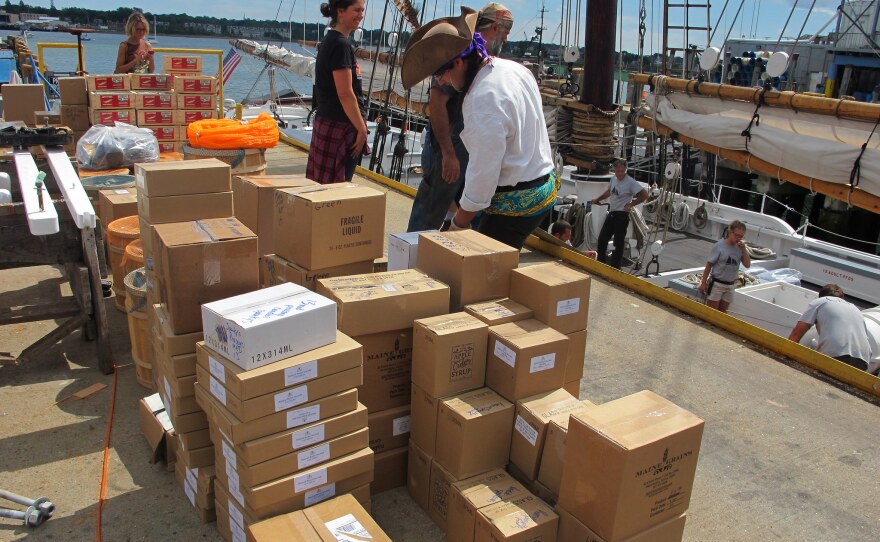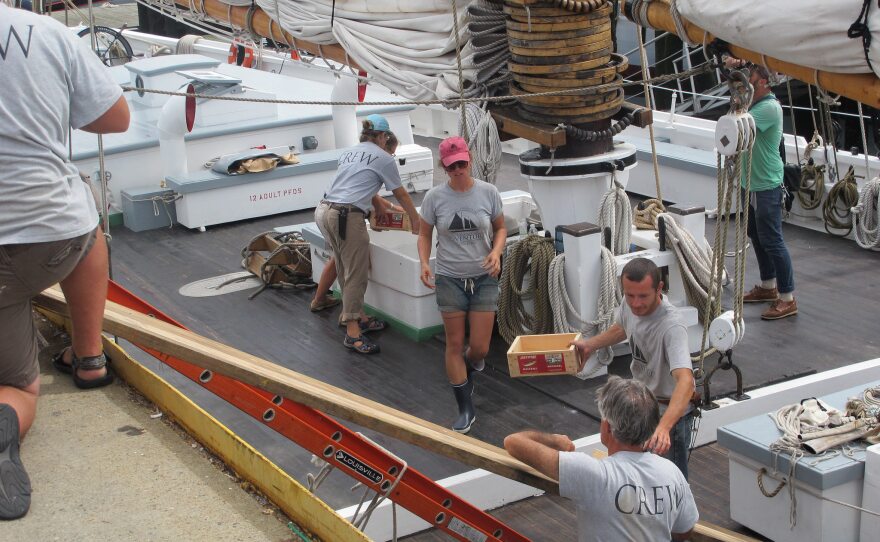PORTLAND, Maine - A 90-year-old, twin-masted schooner sailed into Portland harbor Thursday morning. The "Adventure," as she's called, arrived to pick up three tons of Maine-grown farm produce. She'll then depart for Boston at first light on Friday.
The project is called Maine Sail Freight, and while it's part of historical re-enactment, organizers say they're also out to make a serious point about food systems and regional economics.
Shortly before noon the schooner Adventure chugged into Portland's working waterfront, with Capt. Stefan Edick at the helm. "Adventure is a 122-foot long knockabout schooner, which means she has no bowsprit, and was a design innovation from the 1890's," Edick says.
She was built in Gloucester, Massachusetts, in 1926, and Edick says she was the most successful fishing vessel to sail out of that port. Now, she's owned and operated as an educational non-profit and listed as a national historic landmark. "She's an extraordinary sailing craft," Edick says. "She has an enormous amount of sail area, she is a fast and powerful vessel that's very maneuverable under sail."
She also has a lot of storage space below decks. Once, it was used for cod, but today it's a different cargo.
"We have many products from many family farms in Maine," says Severine Fleming, who managing the Sail Freight project. She's also director of Greenhorns, an advocacy group that supports America's new generation of young farmers.
Soon after the Adventure's arrival, Fleming discusses with Edick how best to load up the cargo. "We're bringing dry beans, maple syrup, pickled beans, pickled fiddleheads, sea salt, seaweed, Maine-grown biscuit mix and grains," Fleming says. "So, basically, everything non-perishable."
The cargo - worth about $70,000 - will be unloaded in Boston Harbor on Sunday. About a third of the goods have already been sold to customers in the area, but the remainder will be transported a few blocks by bicycle to the city's public market.
Leah Cook says the idea is to educate people about local food systems and how relevant they are, even in a globalized economy. Cook is with Fiddlers Green Farm, which is supplying much of the produce for the project.
"I think it's important to be thinking creatively about transport and about provenance," she says, "so where our products are coming from and where they're going is something that's pretty important to us as Mainers who have multiple businesses producing food."
Meanwhile, at the Portland waterfront , 6,000 pounds of farm goods are stacked up waiting to be loaded onto the schooner Adventure. First Mate Bill Burke gives a safety briefing. "Some of these boxes are light, but some are heavy. We all have 10 fingers to start."
Listening attentively are about a dozen volunteer stevedores who have turned out to help load. Among them is Jim Cornish, a heavily bearded farmer and teacher from the Midcoast. This project is important to him, he says, because it offers lessons from the past. "The ocean's always going to be here, and the wind's always going to blow. We don't know the same thing about fossil fuel or nuclear power or whatever else."
"Do I think this is sustainable in that we're going to start moving the bulk of our food around by sail? No I don't," says Stephanie Welcomer. But, says the UMaine business professor, the Maine Sail Freight project does an important job of demonstrating how reliant all food production and distribution systems are on a fossil fuel-based transportation model. "And as we know, with climate change it's important to think about how we can reduce our reliance on fossil fuels."
And this, she says, involves coming up with new business models for the 21st century.






